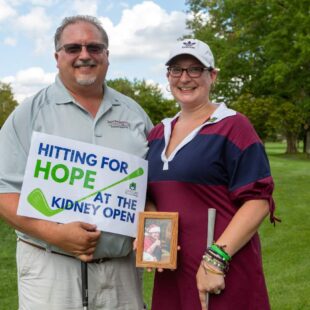Caregiver LifeLine Spotlight: Nutrition Tips After Organ Transplant
By making these healthy food choices and exercising on a regular basis, you can maintain a healthy weight and delay diabetes.
By Carlene N. Bowen, RD, LDN, CNSC
Malnutrition prior to transplant is common amongst most end organ diseases. Prior to transplant, most patients have to follow some dietary restrictions due to the limitation of their organs. Some patients hope that having a transplant will elevate some of those dietary restrictions and bring improved quality of life. Contrary to some medical advice, a transplant patient cannot “eat whatever they want”.
The immunosuppressant medication that is taken to protect the new organ may cause some nutrition-related complications, which may require new or additional dietary restrictions. Some of these complications includes, but not limited to diabetes or NODAT (new onset of diabetes after transplant), excessive weight gain, hypertension (high blood pressure) and hyperlipidemia.
The cause of NODAT is multifactorial, with can include, but not limited to factors such as the post-transplant medication regimen, age, weight status and family history. The onset of NODAT can be delayed or prevented by practicing a few healthy habits. Monitoring your blood glucose level is critical step in knowing your risk for DM; this should be done with each post-transplant doctor visit. Your doctor can check a hemoglobin A1C level; this test gives a three month average of your blood sugar. A number greater than or equal to 6.5% indicates a diagnosis of NODAT.
Take control of your diet by limiting foods that contain added sugars such as sweets, desserts, and sugar-sweetened beverages. Instead, choose foods that contain whole grains and that are lower in calories and fat. By making these healthy food choices and exercising on a regular basis, you can maintain a healthy weight and delay diabetes.
Excessive weight gain is common in the transplant population; this can be caused when dietary restrictions are gone thus liberalizing the diets. Some medication can cause an increase in appetite, which leads to overeating of not so healthy foods. Chose foods that are fresh and minimally processed, which include whole grains, lean meats, low-fat dairy products, fruits, and vegetables. Ongoing nutrition education and regular physical activity are two keep components in preventing excessive weight gain. Weight management programs such as Weight Watchers can help the patient to lose and maintain a healthy weight.
Hypertension is a common side effect of immunosuppressant medications. A diet that is low to moderate in sodium (2000-3000 milligrams/day), along with weight management and exercise may help in the management of high blood pressure. Medication maybe required if the blood pressure remains elevated, despite a having a healthy lifestyle. Choose foods that are made from scratch and limit use of pre-made or boxed foods. If you use canned foods, chose those that are labeled as “no added salt” or “low sodium”.
Hyperlipidemia is also a common side effect of some of the immunosuppressant medications that are prescribed. Limiting fats in your diet can help to lower your risk of heart disease. Choose lean meats, poultry, and fish or beans, peas, nuts, or seeds. Cook using low-fat methods like baking, broiling, or steaming. Reduce the amount of fat and oil you use, as well as, using healthier oils, like canola or olive oil.
In addition to following a healthy diet, it is important for a post-transplant patient to take precaution to avoid foodborne illness, by selecting, cooking and storing your food. Some of the basic rules include avoiding undercooked meats, poultry, eggs, raw fish, such as sushi or sashimi, and raw milk or unpasteurized dairy products. Avoid herbal supplements and any over-the-counter medications that were not prescribed by your transplant team.
The registered dietitian (RD) at your transplant program is a great resource for food safety and nutrition information after transplant. If your program doesn’t have an RD, you can find on at the Academy of Nutrition and Dietetics (AND) website www.eatright.org under “Find an Expert”.
About the Author

Carlene N Bowen, RD, LDN, CNSC is registered dietitian for the Jefferson Transplant Institute (JTI) and have over fifteen years of experience in the field of nutrition and dietetics. She has been in this current position for the past six years, where she provides nutrition education for the transplant patients in the heart, kidney, liver, and pancreas program. She also works with any potential kidney and liver donors. She is also a preceptor for nutrition students from various internship programs. Carlene enjoys volunteering with the various organizations, such as The American Heart Association- (AHA) Passion Committee, the American Liver Foundation ( ALF) and the National Kidney Foundation (NKF). She is a member of the Associate Medical Advisory Committee (AMAC) of ALF Mid Atlantic Division and the Academy of Nutrition and Dietetics.
Resources: “Nutrition Following a kidney transplant” Renal Dietitian Practice Group 2015
For more transplant support, please check out the Caregiver LifeLine Program and its resources here!







